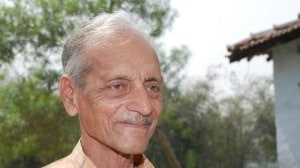Maratha quota hearings to resume: Why has the process restarted, what’s happened so far?
A new three-judge Bench of the Bombay High Court will take up hearings that were paused after the earlier Chief Justice was transferred. Why led to Chief Justice of India B R Gavai to intervene in the matter at this stage?
 The Maratha quota was a major issue in the Lok Sabha election and the Assembly elections held later that year. It is now expected to have an influence over the upcoming local body elections in the state. (Express Archives)
The Maratha quota was a major issue in the Lok Sabha election and the Assembly elections held later that year. It is now expected to have an influence over the upcoming local body elections in the state. (Express Archives)The Bombay High Court this week constituted a new three-judge Bench to resume hearings on the challenge to the reservation in jobs and education granted to the Maratha community last year.
In February 2024, weeks ahead of Lok Sabha elections, the government of then Chief Minister Eknath Shinde enacted the Maharashtra State Reservation for Socially and Educationally Backward Classes (SEBC) Act, 2024, which created a 10% quota in education and public employment for Marathas under the Socially and Educationally Backward Classes (SEBC) category.
The Maratha quota was a major issue in the Lok Sabha election and the Assembly elections held later that year. It is now expected to have an influence over the upcoming local body elections in the state.
The law was challenged in the High Court on the grounds that Marathas were not a backward community in need of reservation, and that the quota breached the 50% ceiling on quotas imposed by the Supreme Court in the Mandal case.
The last hearing in the matter took place almost seven months ago.
Why was the hearing paused?
A three-judge or “Full Bench” of the High Court comprising then Chief Justice Devendra Kumar Upadhyaya and Justices Girish S Kulkarni and Firdosh P Pooniwalla had begun hearing the challenge in April 2024.
The petitioners concluded their arguments on October 14, and Advocate General for Maharashtra Birendra Saraf opened arguments for the state on November 11.
However, before the proceedings could be concluded, Chief Justice Upadhyaya was transferred as Chief Justice of Delhi High Court. He took oath on January 21 this year; Justice Alok Aradhe took charge as Chief Justice of Bombay High Court that same afternoon.
So what has happened now?
On May 13, a day before he took charge as Chief Justice of India, Justices B R Gavai heard, along with Justice Augustine George Masih, a petition filed by students appearing for the 2025 National Eligibility-cum-Entrance Test (NEET) for admission to medical colleges.
The petitioners sought an interim stay on the implementation of the 2024 Act, arguing that the delay in resolving the legal challenge affected their right to equal opportunity in admissions.
The previous Full Bench led by then Chief Justice Upadhyaya had clarified on April 16, 2024 that any applications for admissions to educational institutions or government jobs taking benefit of the impugned Act would be subject to further orders in the ongoing proceedings.
The Supreme Court acknowledged the delay and directed Chief Justice Aradhe of the Bombay High Court to set up a new Bench to expedite hearings. The top court also asked the High Court to urgently consider the interim relief sought by the petitioners.
Complying with the SC’s directive, the HC on Thursday (May 15) notified a new Full Bench comprising Justices Ravindra V Ghuge, N J Jamadar, and Sandeep V Marne to hear the public interest pleas and writ petitions challenging the Maratha quota Act.
How has the issue of Maratha reservations played out earlier?
The Marathas, who constitute almost a third of Maharashtra’s population, are historically recognised as a “warrior” community, most of whose members belong to agricultural and landowning backgrounds.
Their push for reservation in education and public employment dates back to the early 1980s and has remained a politically sensitive question, particularly during state Assembly and parliamentary elections.
Previous legislative efforts to create a Maratha quota have faced legal setbacks. In 2014, the Bombay HC had stayed a previous law granting reservation to the community, and the SC had subsequently declined to vacate the stay.
In 2017, the Maharashtra government formed the Maharashtra State Backward Class Commission (MSBCC) headed by Justice M G Gaikwad (retired), and based on its findings, The SEBC Act, 2018 was enacted.
In June 2019, the Bombay HC upheld the validity of the SEBC Act but concluded that the 16% reservation originally proposed was not justified. The court scaled it down to 12% for education and 13% for government jobs.
However, in May 2021, a Constitution Bench of the Supreme Court struck down the 2018 law. The SC ruled that the state had failed to demonstrate “extraordinary circumstances” required to breach the 50% reservation ceiling limit laid down in the 1992 Indra Sawhney (Mandal) verdict of the Supreme Court.
So, on what basis did the government bring the SEBC Act, 2024?
On February 20, 2024, the Maharashtra legislature unanimously passed the SEBC Bill, drawing from the findings of an MSBCC led by retired Justice Sunil Shukre. The Shukre Commission had concluded that the Maratha community qualified as being socially and educationally backward.
It noted that there were “exceptional circumstances and extraordinary situations exist” to grant reservation to the “entirely marginalised” Maratha community in excess of the 50% total reservation in the state.
The Commission found an “alarming” increase, from 0.32% to 13.7%, in the six years since 2018, in the rate of girl child marriages among Marathas. It also observed a substantial decline in the representation of Marathas in government services.
The earlier Gaikwad Commission had surveyed 43,629 families from villages in 355 talukas where Marathas formed the majority. The Shukre Commission’s survey was much wider, covering more than 1.58 crore families across Maharashtra.
What has been argued before the High Court so far?
The petitioners have argued that the 50% reservation cap could be breached only after Parliament amends the Constitution.
They have argued that the 2024 Act has nothing new over the 2018 law — which has been struck down – other than the state’s claim that the Shukre Commission’s survey was wider.
AG Saraf has justified the law, arguing that it has been formulated after rectifying the earlier reservation, and is based on guidelines laid down by the SC.
He has argued that it is open to the state government to revisit the quota issue and to enact a law based on a detailed, large-scale survey.





- 01
- 02
- 03
- 04
- 05

































